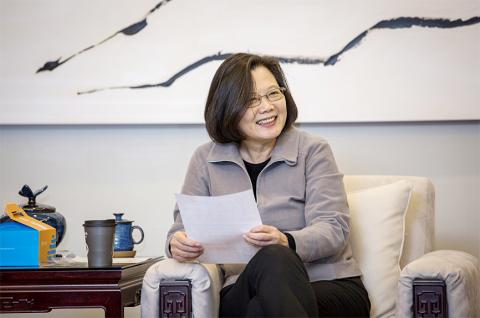President Tsai Ing-wen (蔡英文) on Friday said that her administration would double down on transitional justice and judicial reform, adding that protecting the nation’s democratic institutions from foreign electoral interference is on the agenda for next year.
“We are not balking from reform,” Tsai said, adding that setbacks to policy do not affect her determination to phase out nuclear power, or to oversee the implementation of judicial reform and transitional justice.
“Although transitional justice has encountered difficulties, we will adjust our approach and get the policy back on track,” she said at an informal session with reporters at her residence in Taipei.

Photo: CNA, courtesy of the Presidential Office
Regarding judicial reform, Tsai said that the nation would soon have to decide whether the courts are to adopt citizen judges, juries, or another system with elements from both, and the legislature would play a large role in that decision.
Major legislative initiatives — including the Labor Dispute Act (勞動事件法) that recently passed the legislature and the proposed “grand chamber” system — were the result of last year’s National Congress on Judicial Reform, she said.
“People will soon understand that the core issues of judicial reform are being addressed,” she said.
Although many have been disappointed by the seemingly slow pace of judicial reform, the speed of reform necessarily reflects the immensity of the problems being confronted, she said.
Broadening citizen participation in the justice system through citizen judges or trials by jury would help address issues of the courts often failing to meet public expectations with judgements, she said.
Whichever solution is adopted, reforms would enact profound changes to how the Taiwanese litigate and usher in a new age for the justice system, she said.
Asked to comment on debate over division of authority for the president and the premier, Tsai said: “There are certain ambiguities in our constitutional framework.”
Historically, an administration relies on smooth cooperation between the president and the premier to make policy, she said, adding that some issues had occurred in her administration despite the largely smooth cooperation between herself and her premiers.
“Many Taiwanese academics base their opinions on the political experience of foreign nations, which is less important than the nation’s own experience,” she said.
The government hope to evaluate the constitutional issues of the past decade and discuss solutions, an effort supported by the Democratic Progressive Party and its think thank, she said.
Last month’s elections have stoked fears that China could interfere with elections using disinformation, which must be considered “a direct challenge to our democratic institutions,” she said.
The government will rise to the challenge with a series of policies and ideas that will improve and protect democratic institutions from foreign meddling, she said, adding that national security issues would claim an important place in her agenda for next year.

Alain Robert, known as the "French Spider-Man," praised Alex Honnold as exceptionally well-prepared after the US climber completed a free solo ascent of Taipei 101 yesterday. Robert said Honnold's ascent of the 508m-tall skyscraper in just more than one-and-a-half hours without using safety ropes or equipment was a remarkable achievement. "This is my life," he said in an interview conducted in French, adding that he liked the feeling of being "on the edge of danger." The 63-year-old Frenchman climbed Taipei 101 using ropes in December 2004, taking about four hours to reach the top. On a one-to-10 scale of difficulty, Robert said Taipei 101

Nipah virus infection is to be officially listed as a category 5 notifiable infectious disease in Taiwan in March, while clinical treatment guidelines are being formulated, the Centers for Disease Control (CDC) said yesterday. With Nipah infections being reported in other countries and considering its relatively high fatality rate, the centers on Jan. 16 announced that it would be listed as a notifiable infectious disease to bolster the nation’s systematic early warning system and increase public awareness, the CDC said. Bangladesh reported four fatal cases last year in separate districts, with three linked to raw date palm sap consumption, CDC Epidemic Intelligence

US climber Alex Honnold left Taiwan this morning a day after completing a free-solo ascent of Taipei 101, a feat that drew cheers from onlookers and gained widespread international attention. Honnold yesterday scaled the 101-story skyscraper without a rope or safety harness. The climb — the highest urban free-solo ascent ever attempted — took just more than 90 minutes and was streamed live on Netflix. It was covered by major international news outlets including CNN, the New York Times, the Guardian and the Wall Street Journal. As Honnold prepared to leave Taiwan today, he attracted a crowd when he and his wife, Sanni,

Taiwanese and US defense groups are collaborating to introduce deployable, semi-autonomous manufacturing systems for drones and components in a boost to the nation’s supply chain resilience. Taiwan’s G-Tech Optroelectronics Corp subsidiary GTOC and the US’ Aerkomm Inc on Friday announced an agreement with fellow US-based Firestorm Lab to adopt the latter’s xCell, a technology featuring 3D printers fitted in 6.1m container units. The systems enable aerial platforms and parts to be produced in high volumes from dispersed nodes capable of rapid redeployment, to minimize the risk of enemy strikes and to meet field requirements, they said. Firestorm chief technology officer Ian Muceus said